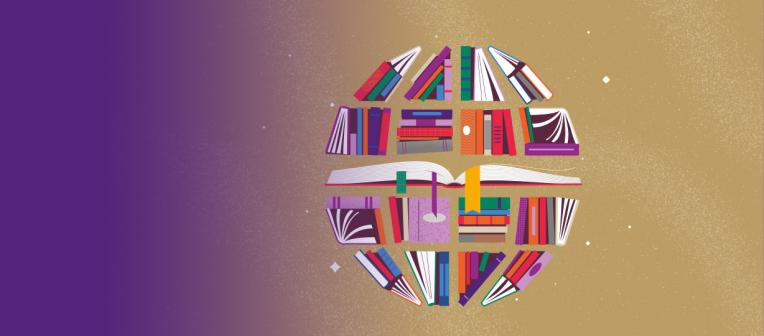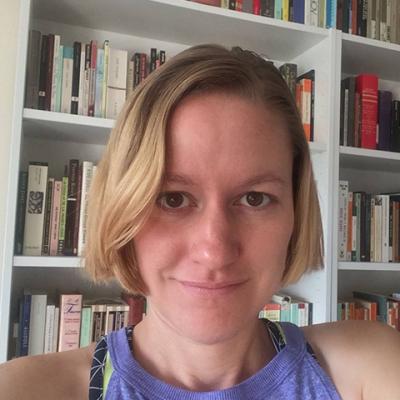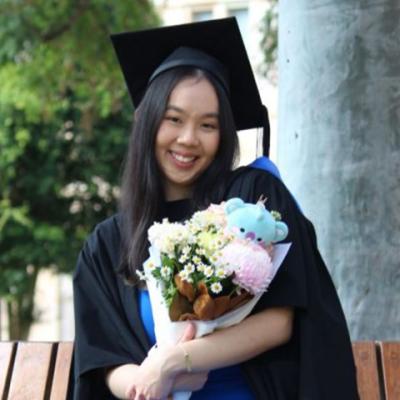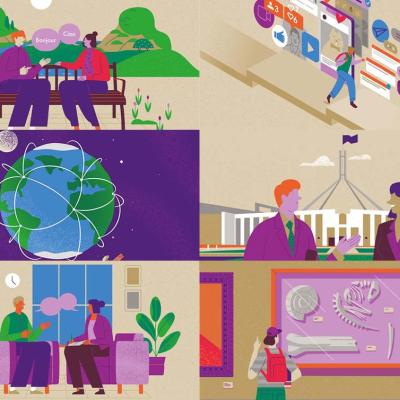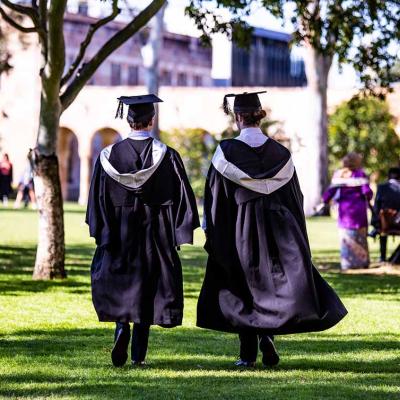Are you a voracious bookworm? Fascinated by how authors around the world and across time have documented and influenced culture?
You might think curling up with a good book is nothing more than an enjoyable pastime. But here’s the best plot twist you’ve read in a while:
You could turn your love of reading into a fulfilling career by studying literature at university.
Including an English Literature major in your Bachelor of Arts (BA) won’t just enrich your study experience and expand your personal library. It’ll also equip you with a unique skill set that can help you thrive in a surprising range of jobs.
So, why study English Literature? We asked Dr Melissa Dickson, UQ Senior Lecturer and our English Literature Major Convener (and a UQ BA alum herself), for some insights. Here’s a quick look at what this area of study offers and the potential careers for English Literature majors.
What makes the English Literature major so good?
One thing that stands out about the English Literature major is that is doesn’t just teach you specific skills. It also enriches your overall perspective and your ability to understand and engage with the world around you.
“Studying literature allows us to encounter, experiment with, and immerse ourselves in a broad range of voices, opinions, experiences, and geographies,” says Melissa.
“In this discipline, we approach the world through the stories that have been told across places and cultures for centuries.”
“We learn to understand how those stories may position, alienate or influence us; we learn to fill the gaps in narratives creatively and with sensitivity to broader structures and their possibilities.”
And this holistic, wise worldview you get from studying literature at university is something you’ll get to use in every professional and personal path you take after graduating. It’s more than just being able to read and interpret books – it’s being able to read any room and interpret any situation and react accordingly. (Though, yes, you’ll likely develop a deeper appreciation of books as well!)
Alumni spotlight: LinLi Wan
- Project Editor at Pantera Press
- Bachelor of Arts (English Literature, Writing) / Bachelor of Laws / Master of Writing, Editing and Publishing
LinLi has turned her passion for reading into an exciting career in the publishing industry.
"My mind was blown when I moved to Australia for high school and discovered my local library – I was bringing home stacks of books and couldn't get over that I didn't have to pay for them," she says.
"That kind of access to literature is a privilege not everyone has, and I very much do not take it for granted."
She is now committed to making this experience more accessible – and more relatable – for others.
What skills do you get from studying literature at university?
Let’s start with the obvious. When you study literature, you become a master of words.
You learn how to read them, how to analyse them, and how to craft them into stories and messages. And this is a hugely valuable ability in almost any job you’ll have after uni.
“Words are the most ubiquitous tools we have at our disposal to make sense of our own stories and the world around us,” says Melissa.
“The study of the fabric of those stories and the words with which they are woven creates new and unending possibilities of interpretation, perspective, and understanding.”
But that’s only the tip of the iceberg.
As omnipresent and influential as words can be, Melissa and her students are often more interested in the larger entities that words contribute to. Understanding words can often be the gateway to understanding something much more complex.
“Even more powerfully than that, though, the study of English Literature is not only the study of words on a page but also of history, landscapes, psychology, law, and spirituality – matters that capture the range of the human experience.”
Why is studying literature important?
When you ask yourself, “why study literature?”, don’t just consider the personal and professional benefits you’ll get from the major. It’s also worth thinking about how you’ll become part of an enduring tradition that has been enriching the human experience for centuries.
Studying literature has always been important – and always will be – for many reasons:
- The human experience is a complex kaleidoscope of perspectives and emotions. Through the themes, narratives and characters of literature, we get to explore this in unparalleled depth. Doing so gives us the empathy and insight to connect with the people around us and be more sensitive global citizens.
- Analysing literature unlocks the ability to interpret and discover deeper meaning in texts of all kinds. Practising this can help you identify true intentions in communication, participate in thoughtful discussions, and sharpen your critical thinking and reasoning skills.
- Writing is a key method we use to memorialise and reflect on our culture, which makes literature a valuable account of history around the world. This gives us a powerful channel to discover how societies were, understand how they are now, and explore ways to make them better in the future.
Careers for English Literature majors
BA graduates with an English Literature major bring a lot to the table for almost any organisation, which is why the career opportunities are a little tricky to narrow down.
You may step straight into a career that’s directly related to literature, perhaps as an author, publisher or journalist. But it’s just as likely you’ll find rewarding work in a field where your literature background is valuable in more subtle ways, especially if you get a job based on your other major or degree (if you study a dual degree).
Either way, having English Literature on your resumé is a bright green flag. It doesn’t just tell employers that you have some great novel recommendations; it also tells them you’ve learnt how to think more deeply and critically than the average job candidate.
“The training that a major in English Literature offers you means that you take forward into your work, life, and future roles a firm sense of how to analyse and evaluate written and oral communications holistically and sensitively,” says Melissa.
“It’s partly for this reason that English Literature graduates are such attractive prospects to today’s employers, who increasingly value their ability to work as a team whilst retaining a passion for independent enquiry, to think creatively, and to communicate in sophisticated ways in speech and writing.”
Alumni spotlight: Gavin Bannerman
- Director, Queensland Memory, State Library of Queensland
- Bachelor of Arts (English Literature, Philosophy) / Bachelor of Science

Gavin leads cultural heritage activities at the State Library of Queensland as the Director of Queensland Memory.
“I believe in curiosity, empathy, responsibility and strategy informing how we collect and share Queensland history,” he says.
“My BA gave me a good grounding in the history of thought and the ability to make an argument, write and articulate a point of view.”
Jobs for literature majors
So, what can you do with a literature major? The sky might be the limit, but there are a few fields that graduates tend to gravitate towards.
“Our graduates go on to roles in areas including media, communications, content production, marketing, PR, teaching, consulting,” says Melissa.
Some of the common jobs for a literature major include:
- publishing executive
- editor
- content writer
- copywriter
- author
- creative director
- arts administrator
- English teacher
- English as a foreign language teacher
- literary coach
- education adviser.
And if this small snapshot of potential jobs isn’t enticing enough, how about a career that currently exists only in fiction (if at all)?
The truth is that many students in this field will end up in jobs we don’t know about today – but you’ll be ready for these jobs nonetheless.
“Future English Literature graduates will also be doing jobs that don’t yet exist,” says Melissa.
“But they will be equipped not only to handle them but to excel in them because of the wide range of adaptable skills that they’ll develop as part of their learning and the teaching offered here at UQ.”
What do you study in English Literature?
The English Literature major courses at UQ include:
- Contemporary Literature: Reading and Writing
- Literary Classics: Texts and Traditions
- Australian Literature
- World Literature
- The Novel: Realism, History, Fiction
- Postmodern Literature
- Gothic Fiction
- Shakespeare and His Contemporaries
- Thinking about Literature: Criticism and Theory
Learn more about UQ's English Literature major Explore other options in the UQ Bachelor of Arts

